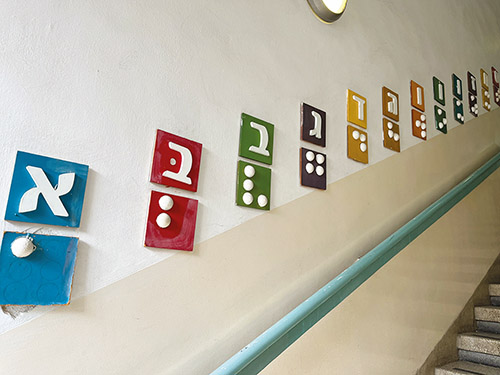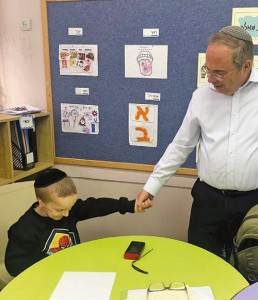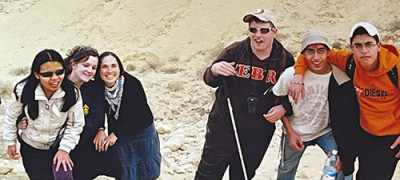
‘The heart sees more than the eyes can imagine.’
When a time-honored and respected Israeli nonprofit, poised for growth, makes a “shidduch” with an American professional with deep experience as a Jewish communal leader, great things can happen.
And when that nonprofit is the Jerusalem Institute for the Blind/Beit Chinuch Ivrim, and the professional is Robert Katz of Fair Lawn, we’re confident that the match will yield remarkable results.
Katz previously served as chief development officer of OHEL Children’s Home and Family Services for 10 years; senior vice president of development for American Friends of Bar-Ian University; executive vice president of American Friends of Migdal Ohr for five years; and director of development, Greater New York, for Hillel International for nearly five years.

He has strong roots in Bergen County, having lived in the area since 1988. The father of four boys, he is one of the founding members of Congregation Beth Abraham in Bergenfield. He and his wife, Susie, a much sought-after ultrasound technician at Englewood Hospital, moved to Fair Lawn in 2011.
The cause that Katz has been enlisted to advance in the U.S. comes with a similarly inspiring pedigree.
The Jerusalem Institute for the Blind (JIB), in Israel known as Beit Chinuch Ivrim, was established 121 years ago by a merchant walking in Jerusalem who noticed a young child who was nearly killed by camels. Rescuing the boy, the merchant found that he was blind, illiterate, and had no skills to make his way in the world. The merchant rallied a few prominent contacts and launched the organization.
Since that time, JIB has grown into a much-respected institution based in the Kiryat Moshe neighborhood of Jerusalem, serving children ages 6 to 21 years old. The organization teaches all students to think of their blindness as a challenge they can overcome, as opposed to a disability that defines and limits them.

As Katz explained to The Jewish Link, JIB serves its constituency and their families with several program areas. The centerpiece is the day school, on a 20-acre campus, that provides education to four to five students per grade in K-12 and provides dorms for graduates who are participating in vocational training. The organization offers Israel’s only sports center for the blind, which includes a pool, a fitness center, a track, a basketball court, a judo hall and a sauna. More than 450 blind people use the center’s sports facility, free of charge, each year. JIB also provides summer camps and psychological services and serves over 700 blind people from across Israel each year.
In a recent visit to the JIB campus, Katz learned more about the empowering philosophy of the organization. He was told by teachers at the school that “we don’t just want our students to be included into society; inclusion is nice but it’s not the end-all and be-all. We want them to be full partners. We don’t want pity for the blind; we want to empower our students to achieve full equality in their lives.”
As one illustration of the impact of their work, JIB sent a team to compete at the International Paralympics, and the team returned with a bronze medal. Following the signing of the Abraham Accords between Israel and four Middle East Muslim countries in 2020, the organization has received a number of inquiries from Arab countries wanting to learn best practices for empowering blind children and teens.
To underscore the impact of the group, Katz shared the following testimonial from an avid supporter.
Dianne Bikritsky, a long-time Teaneck native who made aliyah last year, and serves as the secretary/treasurer of JIB, said: “Blindness has been a part of my life experience. My parents were both blind their entire lives and raised sighted children. They were known for their independence that they learned through institutions like the JIB. My uncle, blind as well, was loved and respected for his wit, his determination, his courage and his brilliance. They learned to be productive members of society, as do the children and young adults at the Beit Chinuch Ivrim. They taught their family that the only things that stand between the visually impaired and a ‘normal life/ was a proper education, a meaningful support network, and a can-do attitude.
“To this day, blind kids with multiple disabilities, with special gifts, and many during summers, holidays and after-school, find life overwhelming, and are terribly lonely. JIB, through their specially designed programs, through the use of compensatory technologies, through sensitivity, courage, and love, has been the answer for hundreds and hundreds of Israeli children and their families throughout the years. When visiting the JIB, one can see that all participants are handled lovingly and respectfully. This gives them power to live up to their potential.”
Katz is currently working to enlist new members to the American board of JIB and welcomes inquiries; he can be reached at [email protected]. He also invites shul and school groups visiting Israel to arrange a tour of the campus. “When you visit Beit Chinuch Ivrim, you will see the incredible work they do and you will be in awe of the teachers, the staff, and the students, as I was,” he said. “It is truly a humbling experience, where you realize that the heart sees more than the eyes can imagine.”
For more information on the Jerusalem Institute for the Blind/Beit Chinuch Ivrim, visit their website at https://jewishblind.org
By Harry Glazer













